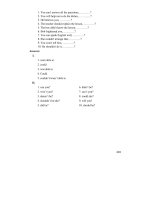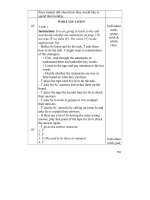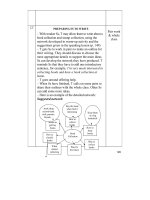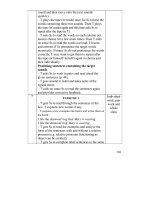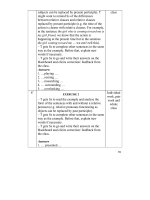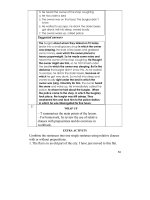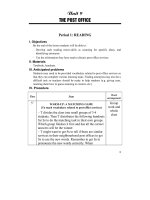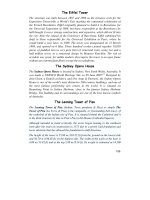Thiết kế bài dạy Tiếng Anh 11 - Review - Period: 49 (writing and speaking)
Bạn đang xem bản rút gọn của tài liệu. Xem và tải ngay bản đầy đủ của tài liệu tại đây (64.62 KB, 6 trang )
<span class='text_page_counter'>(1)</span>REVIEW Period: 49 ( Writing and Speaking) I/ Aim: help students to review the outlines of the writing and speaking they have learnt. II/ Teaching aids: handouts. III/ Teaching method: communicative IV/ Teaching procedure: Teacher’s activities Students’ activities Warm-up: Put questions: - What kinds of writing you have learnt from - discuss in pairs to find the answers. - write the answer on the board. unit 1 to 5? - Can you tell me their outlines? - remind sts the outlines of these writings, taking notes on the important points. - ask sts to do the exercises ( handouts) - move around to control sts’ discussing. - ask sts to write the answer on the board. - correct mistakes. * Homework: ask sts to review the outlines and do the exercises again. Handout for Writing and Speaking: I/ Rearrange the words or phrases to make sentences: 1. cooking pot/ the first/ rinse. 2. the/ boil/ then/ water/ wash/ rice/ and/ the. 3. the/ into/ water/ the/ is/ boiling/ pour/ rice/ the/ while/ cooking pot. 4. the/ two/ then/ rice/ stir/ with/ chopsticks. 5. keep/ fire/ and/ after that/ low/ the/ 10 minutes/ to be cooked/ wait/ the rice/ for /for. II/ Use the prompts below to complete sentences about Marie Curie: 1. Marie Curie/ born/ Warsaw/ November/ 7th / 1867. 2. She/ harbour/ dream/ a scientific career. 3. She/ study/ very well/ Sorbonne. 4. She/ be/ award/ Nobel Prize/ Chemistry/ determine/ atomic weight of radium. 5. She/ be/ first/ woman/ professor/ Sorbonne. III/ Choose the sentences or phrases that best complete the dialogue: Shop assistant: Good morning, Madam ………………………(1)? Customer: ……………………………(2) I bought this silk dress last week, and I washed it and it became so small. Look at it . S: Oh, Yes……………………………….(3) . C: And I paid 8 dollar for it. That’s expensive. S: It is. Well, …………………………..(4). C: No, thank you. I just want my money back. S: Well, perhaps you like other things for the same price. Lop11.com.
<span class='text_page_counter'>(2)</span> C: …………………………..(5) I just like money back please. S: Oh, I’m very sorry……………………………………………(6). A. I’m terribly sorry B. Yes, I hope so. C. Would you like to take another silk dress of the same quality? D. Yes? E. Maybe I like. F. I’ll organize it. G. No, I’d rather not. H. Can I help you ? ANSWERS: I/ Rearrange the words or phrases to make sentences: 1. Rinse the cooking pot . 2. Then boil the water and wash the rice. 3. Pour the rice into the cooking pot while the water is boiling. 4. Then stir the rice with the two chopsticks. 5. keep the fire low and after that wait for 10 minutes for the rice to be cooked. II/ Use the prompts below to complete sentences about Marie Curie: 1. Marie Curie was born in Warsaw on November 7th , 1867. 2. She harboured the dream of a scientific career. 3. She studied very well at Sorbonne. 4. She was awarded Nobel Prize in Chemistry for determining the atomic weight of radium. 5. She was the first woman professor at Sorbonne. III/. 1. H. 2.B. 3.C. 4. A 5.G 6. F ---------------------------------------------REVIEW Period: 50 (Reading). I/ Aims : help students to : - improve vocabulary. - review the tasks that are applied to reading exercises. II/ Teaching aids: handouts. III/ Teaching method: communicative IV/ Teaching procedure: Teacher’s activities Students’ activities Warm-up: - discuss in pairs to find the answers. Put some questions: - What will you do this summer? - Do you visit your grandparents? go for a picnic or -> go camping. -> we should carry clothes, foot,….. go camping? - What should we prepare for a camping trip?. Lop11.com.
<span class='text_page_counter'>(3)</span> -> Introduce the reading. Exercise 1+2: Read the passage and do the tasks that follow ( handouts) - ask sts to do the exercises . - work in pair to do the exercises - move to control sts’ discussing - write the answer on the board. * Homework: ask sts to review the reading from Unit 1-9. Handout for reading: Exercise 1: Read the passage and answer the questions: Camping holidays are always popular with students and young people. They are cheap and easy way to see a country. People often traveled by train, by coach or on foot. So one thing to remember before starting: you can only take with you what you can carry- usually in a rucksack on your back. If you travel with a friend, of course some items can be shared- a tent, a gas stove, food. Other things must be taken each person- clothes, footwear, a sleeping bag. So you must be sure of how much you carry. Most people find 10 kg about right. Much more than that and you need another holiday when you get home! And remember, if the weather is wet your rucksack is heavier. Many people who go camping for the first time take too much and then find they have forgotten the essentials- a tin of beans is no good without opener! But with practice or good advice you can have a fantastic holiday. I/ Questions and answers: 1. Why are camping holiday popular with students and young people ? -> Because they are cheap and easy way to see a country. 2. In what ways do they often travel ? -> People often traveled by train, by coach or on foot. 3. How do they usually carry things with them ? -> ….. . usually rucksack on your back. 4. Does each person always have to carry everything? Why? Why not? -> No, he doesn’t. He can only take with you what you can carry. 5. What should campers remember? -> They should remember that if the weather is wet your rucksack is heavier. II/ True or false: 1. If you go camping holiday, you can carry nothing besides a sleeping bag. ………F……… 2. Many people who go camping for the fist time often bring too many things. ………T……... Exercise 2: Read the passage: Albert Einstein was born in Germany in 1897. When he was at school he disliked the formal system of education and started studying on his own theory of physics. In 1905, Einstein published four important papers on relativity. In 1921 he won the Nobel Prize in physics. Lop11.com.
<span class='text_page_counter'>(4)</span> In private life, Einstein was quiet man who liked taking long walks, sailing and playing violin. He died in 1955. Today he is still remembered as a great scientist. Answer the following questions: 1. When and where was he born? -> Albert Einstein was born in Germany in 1897 2. How many important papers on relativity did he publish in1905 ? -> four important papers on relativity. 3. What did he win in 1921? -> In 1921 he won the Nobel Prize in physics. 4. What were his hobbies? -> taking long walks, sailing and playing violin. 5. Is he still remembered as a great scientist today ? -> Yes, he is. ---------------------------------------REVIEW Period: 51+ 52 ( Grammar) I/ Aims: help students to review the grammar points they have learnt: 1. Relative pronouns ( Who, Which, That). 2. V- ing or To infinitive; 3. Because of or in spite of. 4. Present progressive or be going to 5. Present perfect active or passive. II/ Teaching aids: handouts. III/ Teaching method: communicative IV/ Teaching procedure: Teacher’s activities Students’ activities Warm-up: ask sts to put the suitable verb in the - discuss in pairs to find the answers. sentence: -> is going to rain. Ex: There are many clouds in the sky. It ……..(rain). -> is getting. Mary ……..(get) married on Sunday next week. - ask sts to distinguish the present progressive or be - take notes. going to. - tell sts to do the exercises (handouts) - write the answer on the board. - remind the grammar points they have learnt. - call sts to write the answer on the board. - check the answer; - give explanation for the answer. * Homework: ask sts to do all the exercises again.. Lop11.com.
<span class='text_page_counter'>(5)</span> Handout for Grammar: Exercise 1: Put the verbs in brackets in the present perfect active pr passive: 1. I (apply)……..for the new job. 2. We (give)…………….ticket to the concert by our mother. 3. The population of our city (rise)……………to nearly one million. 4. How long (you/study)…………….English? 5. A new car (just buy)…………….by my father. 6. We (tell)…………..about her death by Mr.Nam. 7. Tom (promote)…………….to the area manager of East Asia. 8. My friend, Joe, (live)………….in New York since 1994. Exercise 2: Put the verbs in brackets in the present progressive or be going to: 1. I’m afraid I can’t come to dinner on Saturday. I (meet) Tim. 2. Look at that car! It (hit)……………..the tree. 3. My cousins (come)……………to stay with us at the weekend. 4. Did you hear that the company(open)………………….a new factory. 5. Kate is really unhappy at work so she (look for)……….a new job. Exercise 3: Fill in the blanks with who, which , that: 1. The building…………………..you can see in front of you is the town hall. 2. My brother, ………………..has just come back from Australia, play the piano very well. 3. The book ………………I wanted to buy was too expensive. 4. The architect……………………designed these flats has moved to Ho Chi Minh city. 5. The young man…………….lives on the corner rides an expensive motorbike. 6. I’m reading the book………………..I bought in Sydney in 1996. 7. I’ll introduce to you the man …………………is sharing the flat with me. 8. Nam…………spent fifteen minutes measuring our kitchen last week is talking to my father. 9. A blind person is the one ………….can’t see anything. 10. These are the pictures ………….my son drew when he was young. Exercise 4: Complete the following sentences using V-ing or To Infinitive 1. It was a nice day, so we decided (go)…………for a walk. 2. Suddenly everybody stopped (talk)………………….. 3. Could you please stop (make)……………..so much noise? 4. I don’t enjoy (write)……………..letters. 5. Does your job involve (meet)……………..a lot of people. 6. He didn’t feel like (work)…………………so I suggested (spend)………….if the day in the garden. 7. Don’t forget (post)…………….the letter I gave you. 8. Our neighbours threatened (call)………….the police if we didn’t stop the noise. 9. I’m still looking for a job, but I hope (find)………………something soon, 10. Hong was in difficult situation, so we agreed( lend) her some money. Exercise 5: Fill in the blanks with Because or In spite of 1. …………..her old age, the woman tries to climb the mountain very often.. Lop11.com.
<span class='text_page_counter'>(6)</span> 2. He can’t climb the mountain, ……………..his old age. 3. People go out to work, ……………the bad weather. 4. ……………….the bad weather, we can’t go out to work. 5. He managed to come school,…………..his illness. 6. …………………large crowds, we could not see what was going on. 7. ……………….his illness, he can’t go to the party. 8. They demolished the house,………………….the bad condition of the house. 9. ……………….the bad condition of the house, we enjoyed living there. 10. ………………the large crowds, there were enough seats for everyone.. Lop11.com.
<span class='text_page_counter'>(7)</span>
